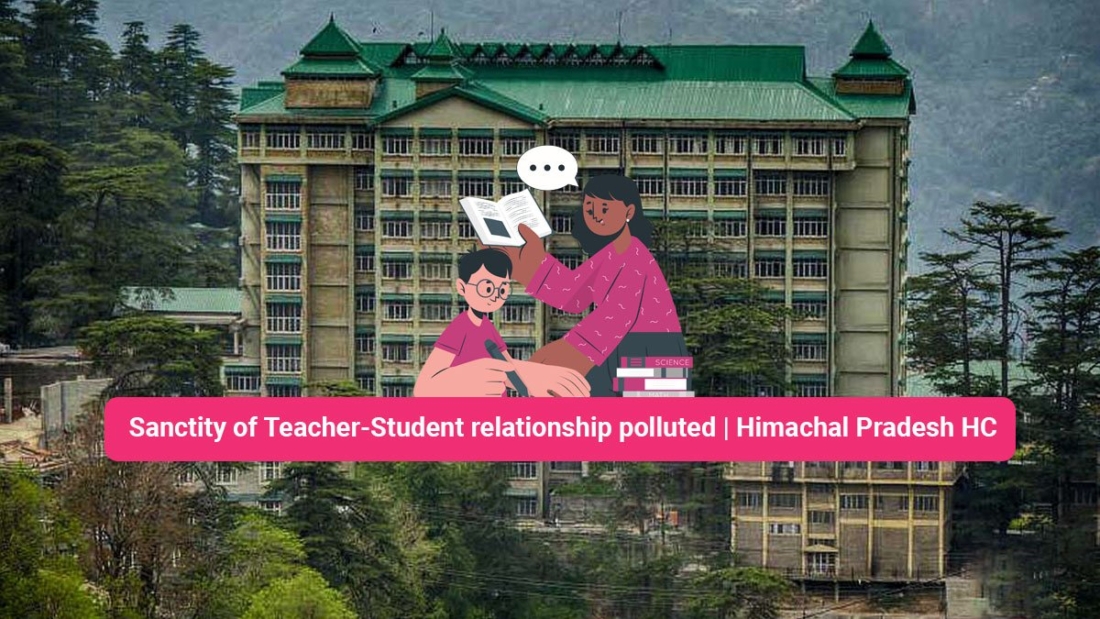In the matter of R.K. vs The State of Himachal Pradesh and S.S. vs The State of Himachal Pradesh, the Hon’ble High Court while hearing the two appeals arising from the common Protection of Children from Sexual Offences Act [POCSO], 2012 judgment held on 21st March 2022 held that there will be no exemption for the reduction in the punishment for the accused guilty of committing the offence of penetrative sexual assault and the person who has the knowledge about the same.
Facts leading to the prosecution case:
A complaint was filed in 2015 by the Center Head Teacher of a Government Primary School on the basis of the complaints received from the aggrieved parents of the 8 minor victim girl students against their teacher (Accused-Appellant 1) alleging that he has sexually assaulted all the 8 minor girl students of the school in the similar circumstances. After the completion of the investigation, charges were framed against the Appellant 1 under Section 354-A (Sexual harassment and punishment for sexual harassment), 377 (Unnatural offences), 376(2)F (Whoever being a relative, guardian or teacher of, or a person in a position of trust or authority towards the woman, commits rape on such woman shall be punished) and 506 (Punishment for criminal intimidation) of IPC and Sections 6 (Punishment for aggravated penetrative sexual assault) and 12 (Punishment for sexual harassment) of the POCSO Act.
Further, charges were also framed against the former Head Teacher (Accused-Appellant 2) under Sections 21(2) (If any person being in-charge of any company or an institution who fails to report the commission of an offence by his subordinate who is under his control shall be punished with imprisonment for a term which may extend to one year and with fine) of the POCSO Act and Section 202 (Intentional omission to give information of offence by person bound to inform) of IPC for ignoring and not reporting about the obscene behaviour of the appellant 1. The trail court found the accused guilty and convicted them.
Dissatisfied with the conviction issued by the Trial Court, Appellants 1 and 2 filed the appeals in the High Court.
Observations of the High Court:
- 11-year-old deposed that appellant no. 1opened the zip of his pants and opened her salwar and inserted his finger in her private part and threatened her to not disclose the same.
- 9-year-old stated that the appellant no. 1inserted his penis in her mouth as well as 7/8 girls of the school and used to kiss them. He also used to discharge white fluid in their mouth. The said act was repeated 7-8 times.
- Another, 9-year-old said that the appellant no. 1used to call her in the room when no other person was there and insert his penis in her mouth.
- Continuing the above acts, appellant no. 1 asked a student to rub his penis but when she refused, he forcibly rubbed his penis with her hands and on one incident he took the student to a newly constructed house and inserted his penis in her mouth and asked her to swallow the white discharge.
- The Court perused the testimony of all the victims as well as medical evidence relating to two victims from which the Court inferred that vaginal penetration has taken place as their hymens were found ruptured.
- The Court remarked that “The victims are young minor girls and were virtually in the guardianship of appellant no. 1, who was the Teacher of the victims. Appellant no. 1 was required to protect the victims and ensure that they were safe and well protected in the school. However, appellant no. 1 had betrayed the trust and had become violator. The sanctity of the relationship of the Teacher and students has been polluted. The offence committed by appellant no, 1 is heinous. It is a sad reflection on the present-day society where a most platonic relationship has been exploited by appellant no. 1.”
- Further, from a compromise document which was signed by both the appellants, the Court found that Appellant 2 had the knowledge of the offence committed by Appellant 1 but he had failed to report the matter to the concerned authorities as per law.
Therefore, the Court upheld the convictions and dismissed both the appeals.
Vaishali Jain, Advocate & Associate – Child Safety at Work & Surbhi Singh
 Cart is empty
Cart is empty 

